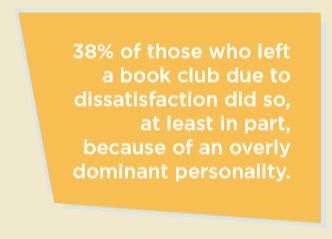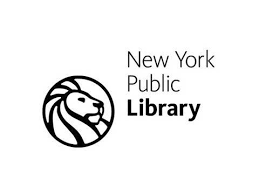As reported in our recent publication The Inner Lives of Book Clubs, the vast majority of book club members surveyed describe their group as a vital and fun aspect of their life. They report enjoying a sense of community and a deepened sense of empathy and, often, close personal friendships.
But even in the most harmonious of book clubs, conflict is likely to arise at some point, and if disagreements are not resolved, problems may grow more intense and people may end up leaving their book club - or worse - they may reach a breaking point and disband the group altogether.
 In our research we've found that one common cause of conflict are overly dominant personalities (ODPs) - people who, whether intentionally or not, occupy too much of the limelight and overpower one or more elements of the book club, such as book selection or the discussion itself.
In our research we've found that one common cause of conflict are overly dominant personalities (ODPs) - people who, whether intentionally or not, occupy too much of the limelight and overpower one or more elements of the book club, such as book selection or the discussion itself.
We have one member who is subtly dominant and sabotages book choices that are more challenging.
One member does a lot of research into books but only in the genre she likes. Because she has done so much work we often feel obligated to choose her books.
One of the original founders sees it as her book club. She talks at least twice as much as anyone else and there can be no changes to our format without her blessing. Members have quit because of this.
One of the members would just talk on about herself and her family; the rest of us couldn't get a word in. It was supposed to be a fun night out but it wasn't, so I quit.
Maggie O'Farrell was born in Northern Ireland in 1972 and grew up in various locations across Wales and Scotland. When she was just eight she contracted encephalitis, an experience she describes in a chapter called "Cerebellum (1980)" in her memoir, I Am I Am I Am. The illness did long term damage, leaving her physically weak and sometimes unstable, and likely brought on neurological traits of unease, oversensitivity and dissatisfaction.
Despite this major childhood trauma, O'Farrell returned to school and attended Cambridge University, studying English before embarking on a career as a journalist. She published her debut, After You'd Gone, in 2000, and is now the author of seven highly acclaimed novels.
In her memoir, I Am I Am I Am: Seventeen Brushes with Death, O'Farrell creates vivid snapshots from her life, based on numerous near-death experiences, but there are only a few references to her successful career as an author. Readers curious to map O'Farrell's literary output to the incidents described in her memoir may find the following chronology of interest:
Choosing only a handful of books to read about the Caribbean is like holding a small mound of snow in your palms. You know each snowflake is unique and you also know that you've only touched a fraction of what is falling from the sky. And while you may be hard pressed to find snow on any part of the Caribbean, you can easily discover countless stories about these 7,000 islands, and all of them are different. Still, just as it is magical to hold those few snowflakes, it is also magical to read any of the half dozen books we've culled together here.
 Many thanks to Michelle Lee, of NYPL's Riverside Library, who tells us about their Grow Up Work Fashion Lending Library!
Many thanks to Michelle Lee, of NYPL's Riverside Library, who tells us about their Grow Up Work Fashion Lending Library!
Can you please tell us a bit about the Grow Up Work Fashion Lending Library? What is it? To whom is it available?
This program lets any teen or adult who has a New York Public Library card with low (below $15) or no fines borrow a tie, briefcase or handbag for job interviews, prom, graduation or other special events. Items may be borrowed once for a three-week loan period, and must be returned in-person to the Riverside Library staff. The late fee is $.25 a day per item. The replacement fee for ties is $25 and varies for briefcases and handbags.
Many people think of book clubs as meeting in people's homes, but the book club world is much more diverse. In fact, according to BookBrowse's research, only 55 percent of in-person book clubs meet in a home.
So, where will you find the rest?
Overall, 17% meet in public libraries, 14% meet in restaurants or cafes, 6% in community rooms, 4% in places of worship, 2% in bookstores and a further 2% at work. You can see the breakdown below:
The voices and stories of Syrian refugee experiences are not the only thing drowned out by the international news agencies' overwhelming focus on conflict, war, and death tolls. Underneath the tragedy, now literally buried beneath the rubble in many cases, is a cultural legacy that has spanned centuries and empires. The empires that ruled over and influenced Syria from the ancient to the modern period included the Mesopotamians, Egyptians, Persians, Greeks, Romans, and Byzantines, with the Ottoman empire ruling from 1516 to 1918. Religious, art, music, and food cultures are the legacy left behind that vary both according to cultural differences and regional differences, as well as a number of UNESCO World Heritage site designations for places of archeological importance across human history such as Damascus, Aleppo, Bostra, Palmyra, Krak des Chevaliers, and Qal'at Salāh al-Din.